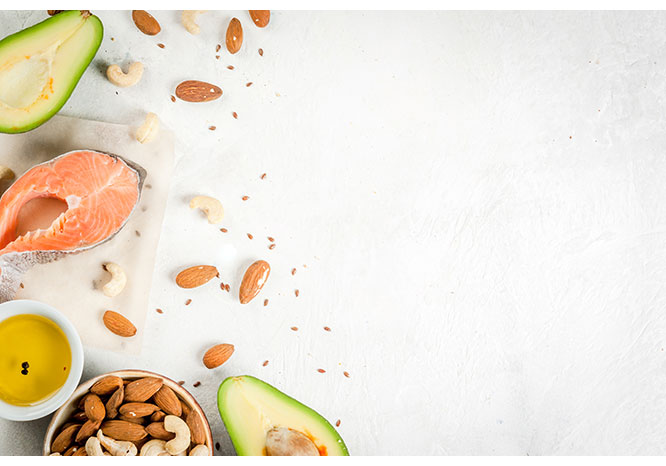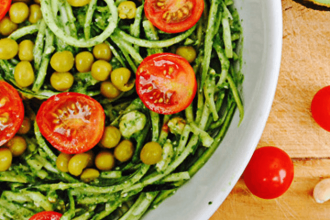Nutritionist Victoria Hamilton delves into the debate about ‘good’ and ‘bad’ fats and how we should be thinking of ways to include more of the beneficial fats in our diet.
Cholesterol has been a mind-boggling subject for some time and unfortunately we still don’t have all the answers! However, insight from recent research is giving us some bearing on what the true culprit is when it comes to heart disease.
Cholesterol readings from your GP are made up of 3 components: high-density lipoprotein (HDL), low-density lipoprotein (LDL) and triglycerides. Broadly, HDL (or “good” cholesterol) removes harmful cholesterol from the bloodstream, LDL (or “bad” cholesterol) delivers fat to cells within the body, and excess calories consumed from food are converted into triglycerides, which provide energy for cell function and are stored in fat cells.
LDL cholesterol has been demonised for its association with heart disease, but studies suggest that it is only when LDL cholesterol is in excess and ‘caramelised’ through exposure to high blood sugar that it may cause destruction in the artery walls leading to plaques that cause heart disease. And let’s not forget that LDL cholesterol – at optimal levels – is essential for bodily functions and delivering fats where they are needed.
LDL cholesterol is essential for bodily functions and delivering fats where they are needed in our bodies.
Therefore, is a high cholesterol reading really an issue or is it more the quality of the cholesterol that matters and the environment that surrounds it?
What recent research does demonstrate is that fat and dietary cholesterol may not be the underlying cause of cardiovascular disease and diabetes after all.
There are various dietary factors which may be influencing the healthiness of your all-important nutrient and oxygen delivering ruby red blood flow and blood vessels. So, what are the main offenders when it comes to heart and circulatory health?
Recent studies have indicated that a diet high in ‘good’ fat and dietary cholesterol, such as avocados, egg yolks and prawns, is not as harmful to the body as once thought. Most people are aware that the low-fat/high-carbohydrate diet fad recommended 30 years ago is somewhat past its sell by date – however, there is still confusion around what is the most heart-healthy diet, especially if you have a family history of heart disease.
Recent research demonstrates that fat and dietary cholesterol may not be the underlying cause of cardiovascular disease and diabetes after all
Genetic variations can play a role in your susceptibility to disease from saturated fats, so it certainly shouldn’t be a “one size fits all” approach in terms of dietary protocols. However, selecting from a line-up of offenders, trans-fats and refined vegetable oils seem to be the most felonious in cardiovascular disease – increasing triglycerides and ruinous LDL cholesterol in the blood.
Processed foods and fried goods such as crisps, chips and bakery products all contain high amounts of these oils and should be side-stepped in your grocery shop. So, it’s the type and quality of fat you eat rather than the amount of fat you eat that is important to understand.
Research shows that eating sugary foods and refined carbohydrates increase blood sugar, causing LDL cholesterol to become oxidised and more damaging to your arteries. And triglycerides, which may contribute to the hardening and thickening of arteries, have also been shown to increase in people with a high sugar diet.
Eating good fats including omega 3 oils from oily fish and monounsaturated fats from extra virgin olive oil and avocados may be the best way to protect yourself from heart disease, as the so-called ‘good’ HDL cholesterol has been shown in studies to be the most distinguishing factor in heart health. This kind of cholesterol may not only help to protect your arteries, but may also prevent the more harmful blood fats from having a destructive effect.
It’s the type and quality of fat you eat rather than the amount of fat you eat that is important to understand.
So, rather than seeking to decrease fats in the diet we should be consuming more of the beneficial kinds. Proving cholesterol’s innocence may take further proceedings but what is clear is that fats are not the felons we convicted them to be and that good fats in the diet are essential for our brain health too!
Consider your cholesterol reading with the above points in mind: HDL, LDL and triglycerides are essential fat transporters in the body – it’s only when they become out of sync, calories are in excess or they are exposed to sugar that they become unlawful, otherwise they may be guardian angels that you should sanction and embrace warmly.
Feature from inside our Thrive Health Magazine Summer issue article written by: Victoria Hamilton. www.victoriajainhamilton.com










